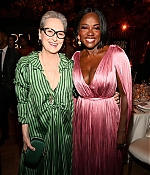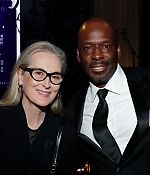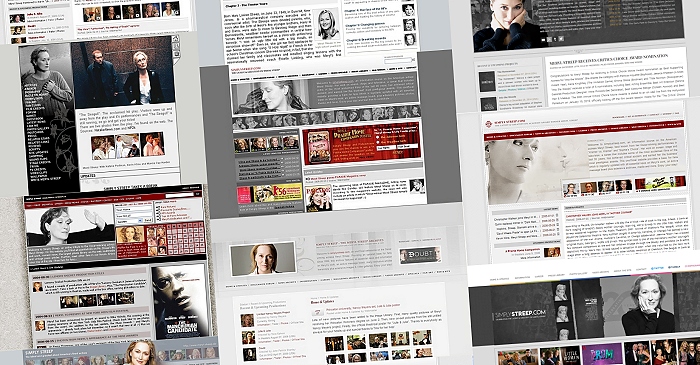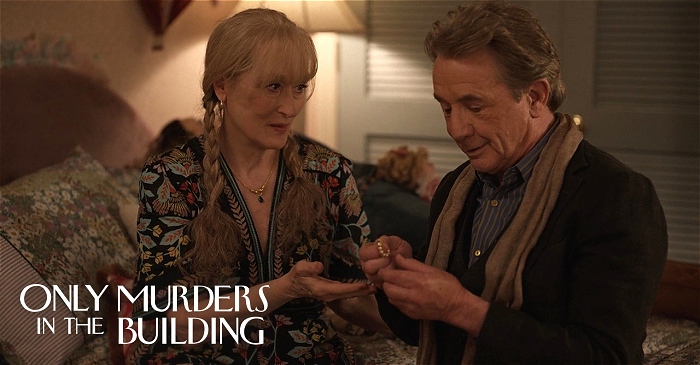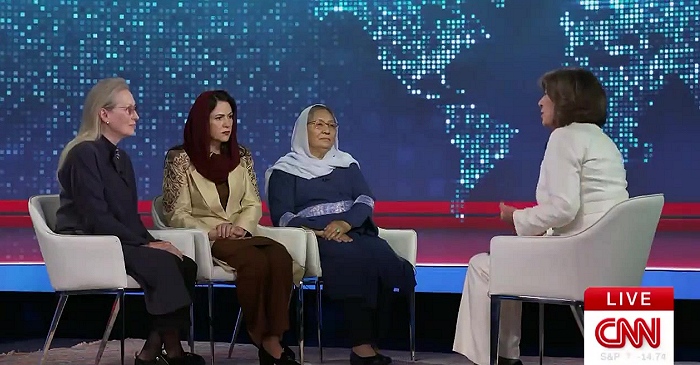
|
Life lessons with Meryl Streep
The Australian Women's Weekly ·
April 2024
· Written by Sophie Tedmanson
|
|
Tags
|

Turning 75, single for the first time in 45 years and celebrating several professional milestones, Meryl Streep is having a moment in 2024. The Weekly pays tribute to an icon.
When Meryl Streep took to the stage at the Screen Actors Guild Awards in Los Angeles in February, it was not to accept yet another accolade. It was to celebrate the 18th anniversary of the film The Devil Wears Prada – alongside her co-stars Anne Hathaway and Emily Blunt – and to pay homage to one of her most famous characters, the fictional fashion magazine editor Miranda Priestly. “It’s an age-old question, where does the character end, and the actor begin?” Meryl said. Emily retorted: “Meryl and Miranda Priestly are like twins.” “I don’t think I’m anything like Miranda Priestly!” exclaimed Meryl, who was appropriately dressed in Prada, alongside Anne in cerulean blue – a nod to one of the film’s most iconic scenes.
Meryl has nearly 100 film and TV credits, from The Deer Hunter, Kramer vs. Kramer and Out of Africa, to most recently Only Murders in the Building. While The Devil Wears Prada may not be her most famous role, with its fashion, comedy and fierce female characters, it is one that has firmly cemented Meryl into the cultural Zeitgeist and continues to tap into our cinematic psyche. The reunion dominated the news of the SAG awards and her charm on stage was a reminder of just how marvellous Meryl is. Turning 75 this June, having more fun on screen than ever before, and now publicly separated from her husband of 45 years, Don Gummer, Meryl is back in the frame, reminding us she is still the Queen of Hollywood, both on and off screen. Meryl doesn’t need to talk about acting to get people to listen. Her reach and cultural impact goes way beyond the screen: Whether she’s going viral for sipping cocktails on Zoom in lockdown, or espousing the merits of motherhood, female empowerment or empathy – her favourite word – Meryl’s life lessons are always in vogue.
On THE ART OF MAKE-BELIEVE
“I am an expert in pretending to be an expert in various areas,” Meryl joked during a commencement speech at Columbia University’s Barnard College in 2010. She listed her “areas of faux expertise”, which included “river rafting, miming the effects of radiation poisoning, knowing which shoes go with which bag, coffee plantationing … Polish, French, Italian … bit of a brogue, bit of the Bronx, Aramaic, Yiddish, Irish, clog dancing, cooking, singing, riding horses, knitting, playing the violin and simulating steamy sexual encounters.” If you were to name one person who defines acting in the modern era, it would be Meryl Streep. Known for her versatility and extraordinary array of accents, she is lauded as the best actress of her generation, with an unparalleled awards tally: 184 wins and 390 nominations in total, including a record 21 Oscar nominations (she’s won three, for Kramer vs. Kramer, Sophie’s Choice and The Iron Lady) and 33 Golden Globe nominations (winning eight). She is one of only a handful of performers to be nominated for the coveted EGOT (an Emmy, Grammy, Oscar and Tony award). Since she first appeared on screen in 1977, Meryl has shaped culture with her roles across all genres – you name it, Meryl’s done it.
Meryl remembers clearly her first conscious attempt at acting as a young girl – then known as Mary Louise – in New Jersey, preparing to perform a Nativity scene at the Streep family home. “I was six, placing my mother’s half-slip over my head in preparation to play the Virgin Mary in my living room,” she recalled during the Barnard speech. “As I swaddled my Betsy Wetsy doll, I felt quieted, holy actually, and my transfigured face and very changed demeanour, captured on Super 8 by my dad, pulled my little brothers into the trance. They were actually pulled into this little Nativity scene by the intensity, by my focus, and I learned something on that day. “Later, when I was nine, I took my mother’s eyebrow pencil and carefully drew lines all over my face, replicating the wrinkles that I had memorised on the face of my grandmother whom I adored. I made my mum take my picture and I look at it now … and I really do remember in my bones how it was possible on that day to feel her age – I stopped, I felt weighted down, I felt like her.”
In high school this desire grew into wanting to learn “how to be appealing”. So, Meryl “studied the character I imagined I wanted to be: That of the generically pretty high school girl … I worked harder on this characterisation really than anyone I’ve ever done since.” She became a cheerleader and starred in a production of The Music Man. During her childhood, Meryl’s mother surprised her with trips to New York City and visits to museums, Broadway shows, and even watching the United Nations in session. These experiences opened up her world, and in turn brought a new world of opportunity to the budding thespian. “Going to the United Nations opened up this door to an idea for me, an idea of peace and reconciliation among strangers who distrusted each other,” she said in a speech at Princeton University. “I think I’ve never really given that up or gone beyond that idea of being a translator, of explaining people to each other, of being a conduit of mutual emotional understanding. I’m only being a little grandiose when I say I think that’s why I’ve always been drawn to characters who are difficult to translate to other people – prissy women, disagreeable women, women whose motives are easily misconstrued, women who are hard to love.”
Meryl once said of her famous accents, including her Lindy Chamberlain accent in Evil Angels in 1988: “The overlay of what an accent is – it’s a colour in a painting.” Of Lindy’s broad Australian accent, Meryl recalled: “I had a special task with this one because I was portraying someone whose life was still in litigation, so I had to be real accurate … She has a very specific way of speaking, which is not necessarily the way a lot of Australians talk – it’s very, very nasal and it’s up in the nose and she goes down all the time to make a point … I really sweat bullets trying to achieve it …” She told The Age at the time that it was very difficult playing someone who exists: “I’m very interested in the idea that there is a set of appropriate responses to any given tragedy. Being an actress, I’m interested in investigating emotions, and I have found in other parts that I have played that there are all sorts of surprises in human behaviour. “Just because someone doesn’t act the way you would expect them to on the television that night may not be a fair indication of who they are and the size of their emotion and feeling.”
This February was the 40th anniversary celebration of Sophie’s Choice, where Meryl played Holocaust survivor Sophie Zawistowski in what is considered one of her best performances. She was joined by her co-stars, Kevin Kline and Peter MacNicol, for a special screening in New York that was attended by Cate Blanchett and Claire Danes, among others. Before the screening began, Meryl noted: “We’re the only ones still standing … the visionaries who birthed Sophie’s Choice are not.” Humble and self-deprecating, Meryl often praises her collaborators, preferring to shift the spotlight onto their work. Accepting her third Oscar for The Iron Lady in 2012, she said: “Oh come on! I had a feeling I could hear half of America going, ‘Oh nooooo, her again’ … but, whatever!” She went on to thank those who worked on the film. Other actors clamour to work with Meryl. Stanley Tucci, who starred alongside her in The Devil Wears Prada and Julie & Julia, said “everyone prays to be in a movie with Meryl … As an actor, you always pray you’re going to work with Meryl Streep, and then your prayers are answered and you become the most nervous person in the universe.”
Penélope Cruz calls Meryl her “number one hero”, recently joking, “I’m always begging my agents to take me to her set, just to bring her coffee or anything … Every time I see her, I run to hug her. And she’s so patient because every time I act like this is the first time I do it.” Nicole Kidman, who has starred with her in The Hours and Big Little Lies, where Meryl played her motherin-law, once said, “I grew up with Meryl Streep, and she was the greatest actress that my whole generation of women aspires to be.” Meryl’s gift is so great it has impacted generations, according to the late director Mike Nichols, who directed her on several projects. Paying tribute to his friend as she received a Life Achievement Award at the American Film Institute in 2004, Mike said: “When a great actor occurs, it changes several generations because human behaviour is redefined. “For other actors, Meryl is not only a life-giving force for those lucky enough to act with her, since it immediately increases one’s talent 1000 per cent simply to look at her in a scene, but she also defines what is possible for an actor as an artist, as a parent, as a citizen. Meryl has created and continues to create a series of unique human beings, each with a soul.”
On MOTHERHOOD
Motherhood is one of Meryl’s greatest roles. In 1998, she told The Washington Post that it was her most challenging role yet: “Mothering – they don’t even say, ‘Thank you’. They don’t even clear the table unless you say, ‘Excuuuse me.’ Real life, there’s no comparison to acting. I can’t really call acting work, since it’s secretly so fun. Even the difficult things; it’s satisfying to do the difficult things well.” Last October it was announced Meryl had separated from Don Gummer, her husband of 45 years. The split came as a surprise, more so for the fact they had quietly parted ways six years earlier but managed to keep it private. Several weeks later, Meryl was joined by her four children and their partners on the red carpet of the annual gala at the Academy Museum of Motion Pictures in Los Angeles, where Meryl was honoured with the Icon Award celebrating her cultural impact around the world. The sight of Meryl flanked by her children – Henry, 44, Mamie, 40, Grace, 37, and Louisa, 32, plus Henry’s wife, Tamryn, and Grace’s husband, music producer Mark Ronson – was a show of the strength of the family bond. Meryl’s children have followed her into showbiz: Henry is a musician whose songs have appeared on soundtracks to his mother’s movies, while her daughters are actresses. Mamie’s first role was alongside Meryl in the 1986 film Heartburn when she was just 20 months old, Grace has starred in Mr. Robot and Dr. Death, and Louisa currently stars in The Gilded Age. Jonathan Demme, who directed Meryl and Mamie as mother and daughter in Ricki and the Flash, even played off their real-life relationship, asking them to remain in character when dealing with each other while making the film. “I talked to Meryl and to Mamie,” Jonathan told USA Today. “It was like, ‘Please don’t be mommy and daughter for the next six weeks. Please. You be Julie who hates her mom. You be Ricki, who left her kids behind and you have that guilt.’”
Mamie admitted she was initially worried about working with her mother in Ricki and the Flash because their characters did not have the same loving relationship with each other and she didn’t want to hurt her mother’s feelings. “There’s this one scene where I really was quite eviscerating and I was worried about if my words actually wounded [Meryl],” she recalled, “but after the first take, I looked over and she just had this big grin on her face, so that was a pleasant surprise.” She later said: “At home she’s not Meryl Streep — she’s Mum; she’s great and I love her a lot.”
On FEMALE EMPOWERMENT
Meryl has a brilliant theory about why men don’t fully understand women. “Women have learned the language of men all their lives, have lived in the house of men all their lives, we can speak it … You know how, when you learn language – Spanish, French – it isn’t your language until you dream in it and the only way to dream in it is to speak it,” she told a panel for the movie The Post. “And women speak men, but men don’t speak women, they don’t dream in it.” The statement left the panel of men, including Steven Spielberg, Tom Hanks and Bradley Whitford, speechless. Michael Schulman, author of Her Again: Becoming Meryl Streep, says it wasn’t until Meryl went to Vassar College, a private liberal arts college in New York, “that her mind opened up to art and books and politics – and her true love, acting”. “One thing I discovered researching her young adulthood in the 1970s is that feminism was formative in shaping who she is as an actress and as a person,” he says. “Meryl came of age in the era of Ms. magazine and consciousness-raising, and that informed her career from the start.
“She never wanted to play the wife or the girlfriend; she wanted to play complicated women at the centre of their own stories. It wasn’t until her later life that she became more publicly outspoken on politics, but that doesn’t mean she wasn’t politically minded all along.” When Greta Gerwig was planning to direct an adaptation of Louisa May Alcott’s Little Women in 2019, Meryl didn’t hesitate to accept a role and to offer the director advice on the story. “Meryl told me she was going to be in the movie … She said the book had meant a lot to her and she wanted to be part of it,” Greta told The View. “She’s so smart, not just about acting but about storytelling, about what are the things you need to tell a story.
“She gave me this entire speech about ‘you have to make the audience understand that women at the time … it’s not that they couldn’t vote or they couldn’t own property, they had nothing – if they left a marriage they wouldn’t even leave with their children’. So I took [Meryl’s] entire speech and gave that to another character [Amy March, played by Florence Pugh] but that’s the amazing thing about working with great actors – they help you understand what you’re trying to do even more.” Meryl champions gender equality off-screen too. She is a spokesperson for America’s National Women’s History Museum and regularly supports women and girls, speaking at universities to inspire the next generation.
During her speech at Barnard, Meryl explained how she finds empowerment through her acting: “Women men. Why? are Because better at we acting have than to be. If successfully convincing someone bigger than you are of something he doesn’t want to know is a survival skill, this is how women have survived through the millennia.” She recalled noticing a remarkable difference in men’s responses to her characters over the space of three decades: From wanting to date the kind and desperate-to-be-loved Linda from The Deer Hunter (1978) to wanting to be the bossy Miranda Priestly in The Devil Wears Prada (2006). “[The Devil Wears Prada] is the first movie I’ve ever had that men came up to me and said, ‘I know how you feel’,” she said. “It is the hardest thing in the world for a man to feel his way through to the protagonist of a film if it’s a woman. “They felt sorry for Linda, but they feel like Miranda. They can relate to her issues, the high standards she sets for herself and others, the thanklessness of the leadership position, the loneliness … They stand outside of one character, but they look through the eyes of the other. This is a huge deal when it comes to the box office.”
On EMPATHY
Empathy is a word that comes up often with Meryl, whose most famous quote is: “Empathy is at the heart of the actor’s art.” “Awards have very little bearing on my own personal happiness, my own sense of wellbeing and purpose in the world. That comes from studying the world, feelingly, with empathy in my work,” she once said. “It comes from staying alert and alive and involved in the lives for the people that I love and the people in the wider world that need my help … Being an actor has opened my soul.” But her empathy is not just in her acting. Ryan Gosling recently recounted a story from the 2007 Oscars, where he asked Meryl to say something kind to his mum, who was embarrassed about wearing a beehive hairdo that was blocking the view of nominees sitting behind her.
“I didn’t know Meryl Streep, but she was sitting next to me and I said in a commercial break, ‘Would you mind just telling my mom you like her hair?’” Ryan recalled on The Graham Norton Show. “And she was like, ‘I got this’. And then the commercial went and she goes, ‘Do you know, I was gonna do a beehive and I wish I had.’ And my mom was like [happily raising hands in the air], ‘raise the roof’ all night.” Cher (a close friend and former co-star in Silkwood and Mamma Mia! Here We Go Again) recounted a time in the 1980s when the pair went for ice-cream in downtown Manhattan and stopped a woman from being assaulted.
“We walk down the street and we hear screaming,” Cher told a US TV corner, ripping show. and the “And clothes this we gigantic come off of around man this girl. is the Meryl starts screaming and I start screaming, and we run toward this gigantic man and he turns and starts running toward us. And … we split and he ran through us. And so we went up to the girl, and all of her clothes were torn and she was clutching her bag. So we’re putting her together, kind of trying to get her to look like she hadn’t just been ravaged, and she looks at us, and she goes, ‘Oh my God! I was saved by Meryl Streep and Cher. I’m an actress, and I work in a cafe where we sing, and all my friends are going to be so jealous’.”
From playing superhero on the streets of New York to empowering women on screen, these are the many reasons we love Meryl.



Posted on November 17th, 2024
|
Posted on November 7th, 2024
|
Posted on November 1st, 2024
|
Posted on October 10th, 2024
|
Posted on September 26th, 2024
|


